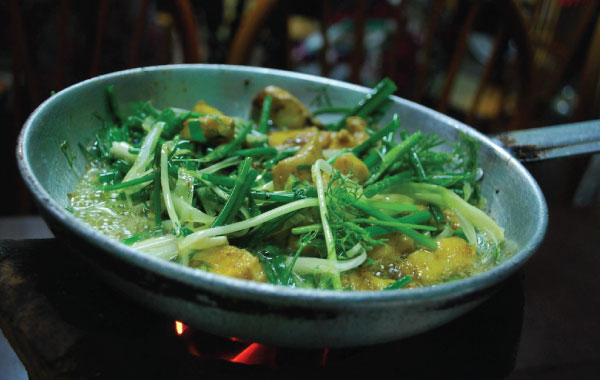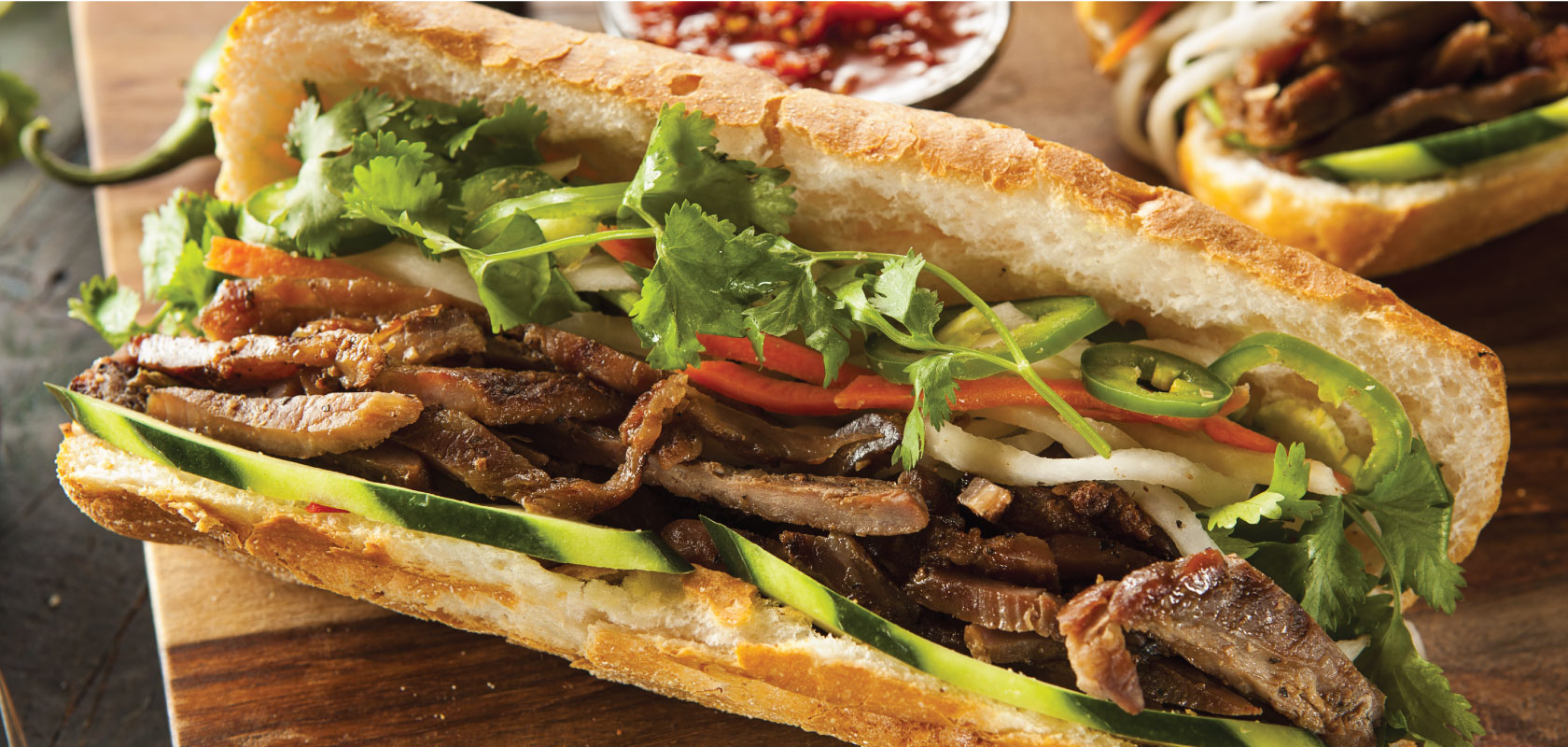In every Vietnamese meal, you’ll find several main features: the ubiquitous bowl of rice, fresh vegetables, broth or soup-based dishes, eye-pleasing presentations and delicious dipping sauces. Additionally, the distinctive flavours of Vietnamese cuisine harmoniously combine five basic condiments including spicy (embodying metal), sour (wood), salty (water), sweet (earth) and bitter (fire). With a subtle blend of aromatic herbs, fresh vegetables and meats, plus a selective use of spices, Vietnamese food is not only quite unlike any other food in Southeast Asia but is also regarded as one of the region’s healthiest cuisines.
Hanoi is famous for local delicacies – like pho, bun cha, cha ca and ca phe trung – which are served at both the humblest street vendors and the most luxurious restaurants.
Pho
This simple soup consists of steamy broth, fresh rice noodles, a sprinkling of fresh herbs, and chicken or beef. Featured predominately in the local diet, a bowl of steamy pho is cheap, tasty and widely available at all hours. (Though it’s often enjoyed as a morning meal!)
Bun cha
Bun cha is the top choice when it comes to lunchtime in the capital. Bun cha is a combination of small grilled patties of seasoned pork and slices of marinated pork belly cooked over a charcoal fire until charred and crispy. The succulent morsels are served with a large bowl of broth that’s heavily seasoned with fish sauce, a basket of herbs and a helping of rice noodles.
Ca phe trung
If you’re having coffee in the morning, why not slurp breakfast down as well? Ca phe trung, or Vietnamese egg coffee, is a northern Vietnamese drink that is similar to a cappuccino. Instead of milk foam, egg foam is made from light and whipped egg yolk and condensed milk. The frothy mixture is then added to brewed coffee.
Cha ca
Savour a satisfying lunch of cha ca, sizzling chunks of grilled fish served on a hot pan tableside. Seasoned with garlic, ginger, turmeric and dill, the fish is eaten together with baked dry pancakes. Enjoy topping it with fennel and roasted peanuts, then dipping everything in mam nem (shrimp sauce) or fish sauce.
How to make cha ca
Can’t make it to Vietnam right now? Bring the flavour of Vietnam into your own home by making cha ca!

Hanoi Fried Fish with Turmeric and Dill (Chả Cá Lã Vọng)
Hanoi Fried Fish with Turmeric and Dill (Chả Cá Lã Vọng)
Fill up on Vietnamese flavours in the comfort of your own home. Chả cá lã vọng, or just chả cá for short, is Hanoi’s famous fried fish with turmeric and dill.
To prepare chả cá, snakehead fish is filleted, cut into bite-sized pieces and then marinated with turmeric, garlic, shallots, sugar and fish sauce. Prior to serving, it’s grilled or baked. Then, it’s fried tableside with a handful of dill in a blistering hot cast iron skillet for a crispy outer crust. The sizzling fried fish and semi-wilted dill are placed on a bed of rice noodles and then eaten together with chopped peanuts, sesame rice crackers and the infamous mắm nêm, a pungent fermented anchovy sauce. Loads of fresh dill is served with the fish along with other assorted vegetables and Vietnamese herbs.
Chả Cá Lã Vọng – Serves 5
INGREDIENTS
Marinade
- 2 pounds firm white fish fillets (snakehead is traditionally used but you can use tilapia or catfish)
- 1 tablespoon turmeric powder
- 1 tablespoon minced garlic
- 1 tablespoon minced shallots
- 1/3 cup fish sauce
- 3 tablespoons granulated white sugar
- 3 tablespoons vegetable oil plus more for deep frying
- 1/3 cup cornstarch
Mắm Nêm Sauce*
- 1 tablespoon vegetable oil
- 1 tablespoon minced lemongrass
- 8 oz finely chopped or crushed pineapple
- Half a bottle of Mắm Nêm, Vietnamese fermented anchovy sauce (strain to remove solids)
- 2 tablespoons granulated white sugar
- 1 Thai chilli peppers sliced thinly (optional)
Other Ingredients
- 1 bunch fresh dill
- 1 bunch green onions (about 5-8 sprigs, cut into 2-inch segments)
- Rice vermicelli (cook per package instructions)
- Chopped peanuts
- Sesame rice paper (lightly wet with paper and microwave or grill until puffy)
* It should be noted that mắm nêm is an acquired taste. While the sauce’s fragrance may be off-putting at first for some travellers, it tastes delicious and is an important component of the authenticity of the dish.
INSTRUCTIONS
Cut the fillets into 1.5-inch pieces. Marinate with turmeric powder, garlic, shallots, fish sauce, sugar and 3 tablespoons vegetable oil for at least one hour or overnight in the fridge.
Fill a small pot with vegetable oil (add just enough to cover the fish) and heat on high. Coat the fish fillets with cornstarch, dust off the excess and fry for 2-3 minutes, preventing the fillets from touching each other. Remove from oil and transfer the fillets to a plate lined with paper towels to absorb excess oil.
Prepare the mắm nêm sauce. In a small saucepan, heat up the vegetable oil on high. Next, sauté the lemongrass until fragrant and then add the pineapple and sauté until it is completely softened. Add the bottled mắm nêm and sugar. Mix well. Add chilli peppers for heat (optional).
To serve, prepare a pan or cast iron skillet with a bit of vegetable oil on the bottom. Traditionally, a lot of vegetable oil is used in the pan when serving tableside but use less oil if preferred. Heat on high and then pan-fry the precooked fish. Add a bit of dill and green onions to the oil for a quick sear.
Prepare a bowl of rice noodles and then transfer the cooked fish and dill to the noodles. Add chopped peanuts, crumbled sesame rice crackers and a ladle of mắm nêm.
Enjoy!


